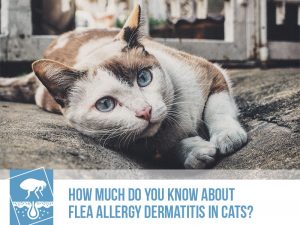
How much do you know about flea allergy dermatitis in cats?

With the temperatures rising the risk of our pets becoming infested by parasites such as ticks and fleas increases tremendously, since these small creatures thrive on warm weather. Fleas can be a real nightmare for pets and for their owners. These parasites will feed on our pet's blood causing irritation, itching and a lot of discomfort.
The problems caused by fleas go beyond itching since they are also vehicles for the transmission of other parasites such as tapeworms and diseases such as cat scratch disease. Unfortunately, some of our pets can also have the added hassle of being extra sensitive to flea bites and suffer from flea allergy dermatitis.
Flea allergy dermatitis is a hypersensitivity reaction caused by proteins (antigens) present in the flea's saliva. Cats suffering from this condition show an exaggerated reaction to flea bites that leads to severe itching, over-grooming and even damage to their skin. All cats can be affected regardless of their age or breed.
It takes just one flea to cause severe itching in pets susceptible to flea allergy dermatitis and the best way to prevent this problem is to keep a regular and effective flea treatment plan.
To check your cat for fleas spread your pet's fur with your fingers, especially on the base of their tale. It is not always possible to see the fleas running around but if you look closely you will probably find their faeces. Look for small black specs located close to the skin.
If you notice your cat is itching more than usual or grooming excessively to the point of damaging fur and skin take your pet to the vet. These clinical signs can be caused by flea allergy dermatitis but other conditions can present similar signs.
It is also very important to remind owners to never user dog tick/flea treatment products on cats! Many of these products contain substances which are highly toxic for cats and are meant to be used only in dogs. Follow you vet's recommendation and always check product labels.
Would you like to know more about cats? Check our Feline Courses:
Feline courses
Published: 21 Jul 2016
Read the previous article: Separation Anxiety in Dogs

